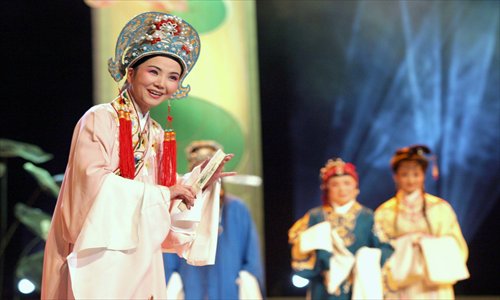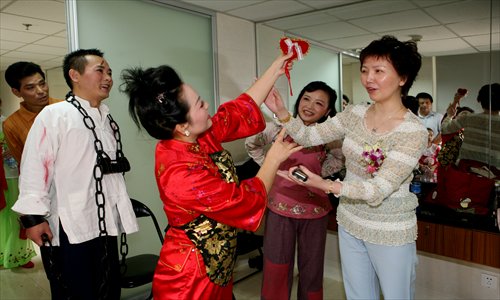As modern as the city
Originating during the reign of the Emperor Jiaqing (1796-1820) in Qing Dynasty (1644-1911) just before Shanghai was opened to foreign trade 170 years ago, Huju Opera (or Shanghai Opera) has evolved along with the city. Just as the name suggests, this form of performance belongs to this city: it is of Shanghai, by Shanghai and for Shanghai.

Mao Shanyu, one of the most respected Huju performers, and the president of the Shanghai Huju Opera Troupe Photos: IC
"Unlike other traditional forms of theater, Kunqu Opera, Peking Opera or Yueju Opera, Huju Opera was born in the city and heavily influenced by the tastes and habits of the local citizens," Mao Shanyu, one of the genre's most respected actresses and the president of the Shanghai Huju Opera Troupe, said.
"Originally, in ancient times, to attract villagers from across the fields, instruments like big drums that could make a lot of noise were necessary for performers. But since Huju Opera was performed in the city, which was already crowded with people, heavy sounds were not needed, and Huju Opera was always relatively quieter and gentler," Mao explained.
According to Mao, the real influences on Huju Opera were Hollywood films and Western dramas (called "civilized dramas" when first introduced into China in the early 1910s). The stories were no longer about historic figures or heroes in myths and folklores, but about ordinary citizens and contemporary situations. The costumes changed as well. Performers started to wear Western suits and qipao, just the way local citizens did.
In 1941, the Huju Opera Troupe was founded and from then on, this kind of performance - a modernized traditional Chinese opera performed in the Shanghai dialect (which had been known as Shenqu, meaning "Shanghai singing") - was officially called Huju Opera.
The first drama they performed was an adaptation of a Hollywood movie, Waterloo Bridge. Later they also adapted classics like Romeo and Juliet by Shakespeare, Rickshaw Boy by Lao She and Thunderstorm by Cao Yu, the latter of which is still among the troupe's repertoire.
"In terms of music, I think we are ahead of other Chinese operas. There are fewer rules to follow so we have more freedom in composing and acting," Mao said, "which makes us closer to Western opera or musicals."
The main barrier to the genre's popularity, however, lies in the language. Almost all other forms of traditional Chinese opera, though they are also deeply rooted in their own regional culture and dialects, can at least be understood by audiences from other parts of the country. But this is not the case with Huju Opera, as few people outside of Shanghai and its neighboring districts can understand Shanghainese.
However, being restricted to just one city may not be a fatal flaw for the art, especially if the city is Shanghai, China's largest and most dynamic city, where a large enough audience can be found. The real challenge, as Mao acknowledged a long time ago, is to keep up with the times and draw locals into the theater.
One advantage Huju Opera has over other Chinese operas is that it has much fewer restrictions on story. A recent example is the production of Daughter of Dunhuang, a story set in the desert of Dunhuang in the northwestern province of Gansu, thousands of miles away from Shanghai.
"I had this idea to make a modern Huju Opera based on real people, who sacrificed a lot to protect the culture of Dunhuang, by October 2011. We worked hard and it debuted in September this year," Mao said. "Many revisions need to be made and if I'm lucky, a better version will be staged by the end of next year."
"Things can't be done in a hurry. Since the Great Leap Forward (1958-61), Chinese people have had this illusion that great goals can be achieved in a very short amount of time. But a play has to be changed hundreds of times to become a real classic, like Thunderstorm," Mao told the Global Times.
Although a good play needs time to be developed, Mao believes that once the curtain goes up, it shouldn't take long for the audience to be engrossed. "Just give me 10 minutes, and then you won't want to leave. You sit down. Two and a half hours passed."

Mao Shanyu (right) gives instructions to an amateur Huju Opera performer.
Another problem facing Huju Opera is attracting new performing talent. Mao admits that in recent years it's been increasingly hard to find kids who can speak standard Shanghainese, but adds that it's not an insurmountable problem.
"Just consider my teachers. They were not local Shanghai people. They came to Shanghai and learned to perform. So it's perfectly okay for me to train kids from other places, who can't speak Shanghainese. We teachers just need to spend more time and have the patience to teach these kids Shanghainese," she said. What's more, Mao sees the need to accommodate change as a positive reflection of the city's dynamism. "It's a good thing that the country has opened up to the world and young people have many choices. In the old days, only kids from poor families came to learn traditional opera. Kids from Shanghai are not poor anymore," she said.
"We speak of a Shanghai style often. What is that? What's the spirit of the city? I think it's like water. You can't hold it. You have to let it flow and adapt to change," she added with a smile.